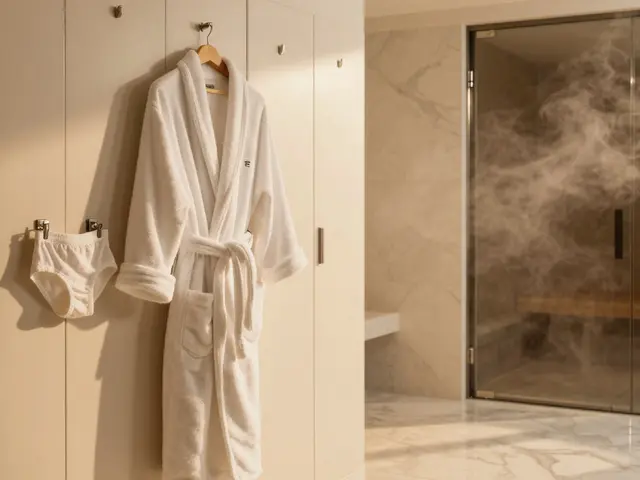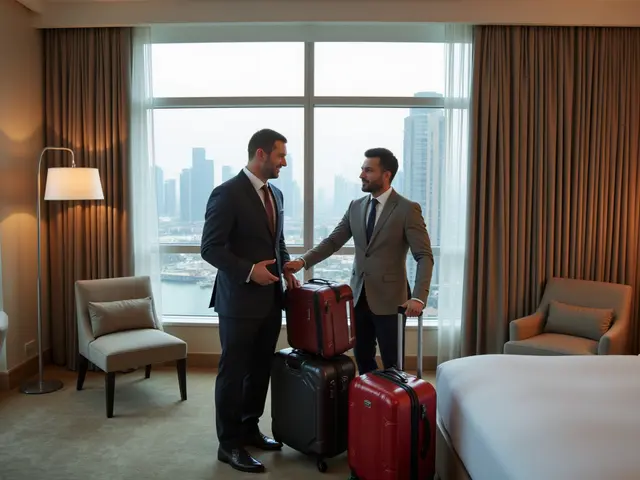Everything You Need to Know About Hotel Extra Person Fees
Picture this: you’re booking a hotel room, all set to split the cost with a couple of friends, or maybe you’re a family traveling with kids. Seems simple enough, right? But then you see something sneaky pop up—a line on your bill for an "extra person" fee. Suddenly the price jumps. You ask yourself: how much is this extra person fee at a hotel, anyway? Why does it exist? Is it always enforced, or are there loopholes if you know what to look for?
Turns out, these fees aren’t just some random trick hotels dreamed up overnight. There’s actually a whole logic (and some serious math) behind them. Some hotels are strict, others super chill, and the difference can mean you either pay a tiny bit more—or a lot. In the US, for instance, the typical extra person charge ranges from $10 to $30 per night. But luxury resorts and some city hotspots (think New York, Vegas) can go north of $50 a night for each added guest. On the flip side, smaller motels or budget-friendly chains might not care at all if you’re squeezing in an extra body—if you watch how you book.
But why do these surcharges exist in the first place? Let’s get real—hotels design room rates based on double occupancy. Their bean counters figure out the cost for two, and anyone over that magic number means more water, towels, breakfast, and sometimes extra cleaning. It adds up, especially for places that offer freebies like breakfast or spa access. An extra head might be the difference between a simple breakfast line and a mob scene in the lobby buffet.
This isn’t just an American thing, either. In Europe, hotels often list their pricing "per person," especially in countries like Italy or Germany. In Asia, some spots turn a blind eye to extra guests, while Japanese hotels are notorious for being sticklers. Always, always check the fine print since booking engines might not display these fees until you’re almost finished.
| Hotel Chain | Typical Extra Person Fee (USD/pkg) | Children Exempt? |
|---|---|---|
| Hilton | $25-35 | Usually under 12 |
| Marriott | $15-30 | Typically under 12 |
| Holiday Inn | $10-20 | Under 18 in many locations |
| Four Seasons | $50+ | Under 17; varies |
| Hostels (Europe) | €0-20 | Rarely applicable |
Now, another curve ball: hotels sometimes define "extra person" differently. At some properties, it’s everyone above two adults. At more family-friendly places, you might not pay unless there are more than four in a room. Some resorts waive the fee altogether if you're a member of their loyalty program. And yeah, kids often stay free, but that depends on their age, so brush up on the policy before you check-in.
There’s strategy here, too. If you’re looking for ways to save, check if booking a room with two beds is cheaper than paying for the extra guest. Or look for "family rooms" or "quad occupancy" setups, which are tailored for groups. Not all hotels police occupancy with the same effort—smaller hotels may rely on honesty, while larger chains sometimes require keycard scans for elevators or breakfast vouchers tied to your reservation details. Crowded events, like conventions, mean staff might keep an eagle eye on guest numbers—don’t push your luck during these times.
Oh, and about sneaking people in—yeah, it happens, but don’t bet your deposit on it. Most hotels can spot when four toothbrushes end up in a room booked for two. And if the safety alarm goes off or you need extra bedding, you’re probably getting the big charge on your bill—sometimes retroactively for your entire stay.
And here's a quirky fact: some hotels charge the extra person fee up front when you book, while others wait and add it at check-in or even at check-out. Always ask the desk or shoot a quick email before you travel. You don’t want budgeting surprises ruining your mood on arrival.
Next time you're booking a hotel room, don’t just breeze past the occupancy and extra fee info—they’re hidden where you might not look until it’s too late. Knowing about extra person charges isn't just about saving cash (though that's a big part). It helps you pick the right rooms, avoid awkward chats at the front desk, and maybe even score a freebie or two if you play your cards right.

Why Hotels Charge Extra Person Fees and Who Must Pay
The thing about hotel extra person fee surcharges is they’re rooted in real costs—and hotel psychology. Hotels set prices assuming two adult guests per room, right? From towels to toiletries, WiFi bandwidth to free breakfasts, every extra guest is another slice of the hotel’s pie. Multiply that by a hundred rooms and it starts to hurt their bottom line, especially when you’re scoring that complimentary breakfast for the third cousin you snuck in.
So, who has to pay? Usually, it's any adult above the standard double occupancy—think third or fourth grown-up in the room. In many American hotels, kids under 12 often stay free (they know kids aren’t eating as much or hogging the towels). But get this: in places like Toronto or Singapore, everyone above the baby in the crib may be counted—it's about how the hotel reads the room occupancy rules.
But, it’s not just about the wear and tear. Hotels use the extra person fee to control the busy-ness of their properties. Imagine the breakfast area overrun, the pool swamped, the lounge chairs gone by 9 a.m.... that’s what happens if every room overloads. Charging a fee? It keeps things manageable for everyone. It also keeps their insurance and safety protocols in check, since every legit guest must be on their books in case of emergencies. Yup, that’s another angle people forget.
Some chains are more strict about who counts as an "extra person." For example, in the US, a 13-year-old might skate free at Holiday Inn but would earn you a $25 per-night fee at a fancier spot. Hostels, weirdly, tend to be more lenient—especially since you’re booking by the bed anyway.
If you’re a pro-traveler or a loyalty member, you might dodge some of these charges. For instance, Hilton Honors members sometimes get the extra person fee waived as a reward perk. Also, military personnel, corporate travelers, and certain group bookings (like sports teams) might get custom rates. It never hurts to ask for a waiver upfront—sometimes just mentioning a child’s age, or promising no extra bedding, gets the fee dropped.
Here's a pro tip: always review the maximum occupancy and fees before booking. Sites like Booking.com, Hotels.com, and Expedia clearly display extra person fees—if you click those "Details" or "Policies" tabs. Booking direct with the hotel’s website can sometimes score you a better deal on extras, or reveal special promo codes that wipe out these annoying fees.
In really busy cities, expect higher fees and stricter rules. In smaller towns or off-peak seasons, hotel staff are sometimes more flexible. Just chat kindly at check-in and state your case—politeness (and honesty) can go a long way in hospitality. But don’t gamble with fire codes: four adults in a room that’s only designed for two isn’t just about money, it’s about your safety. In rare cases, pushing it can get you kicked out—no refund, either.
One wild trick for families: sometimes, booking two connected rooms comes out only a bit more expensive, but with way more comfort and less chance of hidden surcharges. Some European hotels, oddly enough, have "triple" or "family" room categories that already work extra guests into the base price—no surprises there.
If you want a straight answer, the industry average for extra person fees in 2025 hovers around $20 per night in the US, and about €15 in Europe. Resort towns and luxury spots push it higher, while rustic motels or business hotels in smaller cities might charge nothing at all.
When you look for a deal, use those filters in booking apps—"free for kids," "family-friendly," or "quad room" can save you from post-booking sticker shock. Simple move, big payoff.

How to Avoid or Reduce Hotel Extra Person Fees
Everyone wants to dodge these annoying fees, right? You’re not alone. The best trick is simply to do your research before clicking "Book." Sites like Kayak or TripAdvisor have side-by-side comparison tools for room types and occupancies, and real traveler reviews sometimes spill the inside scoop about which properties are strict or relaxed with surcharges.
Check if the base room rate for a room with two double beds or a larger suite comes out cheaper on a per-person basis than paying the nightly extra guest fee. Sometimes, those family category rooms are a steal compared to paying three $25 fees over a long weekend. Don’t forget to add in freebies—complimentary breakfast for four is often included, saving you even more.
- Sign up for the hotel’s loyalty program—at some chains, all sorts of extras get wiped off your bill just for being a member (even if it’s your first booking).
- If you’re traveling with kids, check the age limit. At some places, kids under 18 can stay free. That’s a huge win.
- Consider calling the hotel directly to ask for a custom rate, especially for longer stays or off-peak visits. Sometimes they’re allowed to waive or adjust these fees for friendly, direct customers.
- If you’re feeling bold (and honest), mention the "fee surprise" at check-in and see if they can help out. Sometimes, just asking for a comp or explaining your group’s needs nets you a discount.
- Look for hotels that offer "occupancy flexibility" as a special—these are places that flat-out don’t care about your group size, especially outside busy weekends or holidays.
Need an example of how much this adds up? For a 3-night stay at a typical big chain, that $25 per extra guest fee means $75 just for the pleasure of an extra sleeping body. Add that to your total before you get excited about the “great deal” you saw online.
Don’t forget taxes—some cities (like New York or LA) pile on occupancy taxes and fees that stack on top of per-person charges, so watch your all-in booking total. And if you get breakfast included, see how many people it covers. Sometimes only the first two are covered, and you’ll pay à la carte for your little ones.
When things go wrong—say you show up with an extra guest by accident—have a chat with the front desk as soon as possible. Most hotels will work with you, as long as you don’t try to hide a whole soccer team in one standard room.
- Avoid adding extra bedding or requesting rollaways, since those draw attention and can trigger extra fees if they weren’t already planned for your room type.
- If you need more room and want to skip surcharges, pair up and grab two adjoining rooms, or ask about suite upgrades. Sometimes, last-minute upgrades to suites can be close in price once extra fees are factored in.
- If you’re attending an event, mention your group booking—sometimes wedding blocks or group rates have the extra fees baked in or waived entirely.
| How to Dodge Hotel Extra Person Fees | Effectiveness |
|---|---|
| Book family/quad rooms | High |
| Use loyalty status or points | Medium to High |
| Call hotel direct for arrangements | High |
| Avoid extra bedding/rollaways | Medium |
| Stay in hostels or budget accommodations | High |
So, there you have it. Hotel extra person fees can be a pain, but they’re not a mystery. Arm yourself with the right info, ask smart questions, compare the right room types, and you’ll sleep easier (and cheaper). The only thing left? Booking the perfect spot for your next trip, now that you know how not to pay a penny more than you have to.






